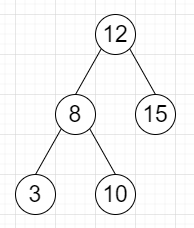
 Data Structure
Data Structure Networking
Networking RDBMS
RDBMS Operating System
Operating System Java
Java MS Excel
MS Excel iOS
iOS HTML
HTML CSS
CSS Android
Android Python
Python C Programming
C Programming C++
C++ C#
C# MongoDB
MongoDB MySQL
MySQL Javascript
Javascript PHP
PHP
- Selected Reading
- UPSC IAS Exams Notes
- Developer's Best Practices
- Questions and Answers
- Effective Resume Writing
- HR Interview Questions
- Computer Glossary
- Who is Who
Program to find k-length paths on a binary tree in Python
Suppose we have a binary tree which contains unique values and we also have another value k, we have to find the number of k-length unique paths in the tree. The paths can go either from parent to child or from child to parent. We will consider two paths are different when some node appears in one path but not the other.
So, if the input is like

k = 3, then the output will be 4, as the paths are [12,8,3], [12,8,10], [8,12,15], [3,8,10].
To solve this, we will follow these steps−
-
Define a function dfs() . This will take node
-
if node is null, then
return a list with 1 and k-1 number of 0s
left := dfs(left of node)
right := dfs(right of node)
-
for i in range 0 to K, do
ans := ans + left[i] * right[K - 1 - i]
res := a list of size K of 0s
res[0] := 1, res[1] := 1
-
for i in range 1 to K - 1, do
res[i + 1] := res[i + 1] + left[i]
res[i + 1] := res[i + 1] + right[i]
return res
-
From the main method, do the following−
ans := 0
dfs(root)
-
return ans
Let us see the following implementation to get better understanding −
Example
class TreeNode: def __init__(self, data, left = None, right = None): self.data = data self.left = left self.right = right class Solution: def solve(self, root, K): def dfs(node): if not node: return [1] + [0] * (K-1) left = dfs(node.left) right = dfs(node.right) for i in range(K): self.ans += left[i] * right[K - 1 - i] res = [0] * K res[0] = res[1] = 1 for i in range(1, K - 1): res[i + 1] += left[i] res[i + 1] += right[i] return res self.ans = 0 dfs(root) return self.ans ob = Solution() root = TreeNode(12) root.left = TreeNode(8) root.right = TreeNode(15) root.left.left = TreeNode(3) root.left.right = TreeNode(10) print(ob.solve(root, 3))
Input
root = TreeNode(12) root.left = TreeNode(8) root.right = TreeNode(15) root.left.left = TreeNode(3) root.left.right = TreeNode(10) 3
Output
4

